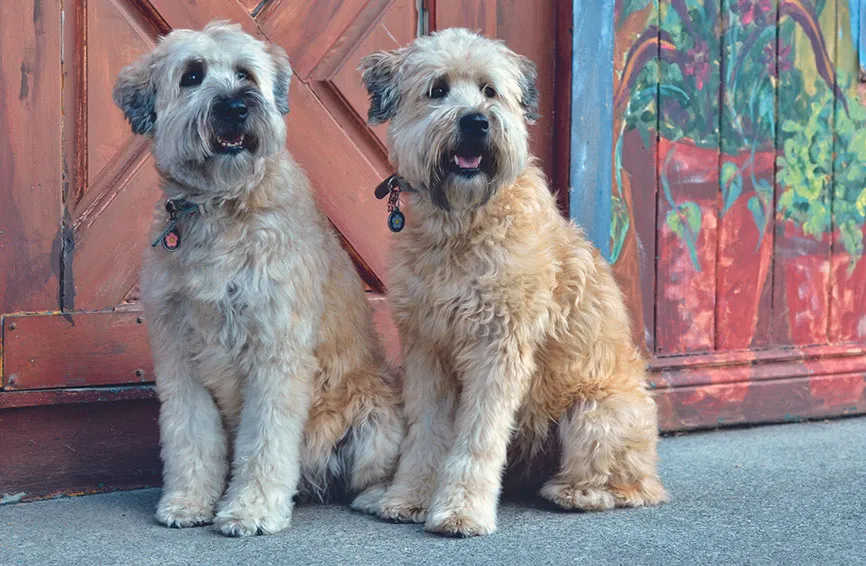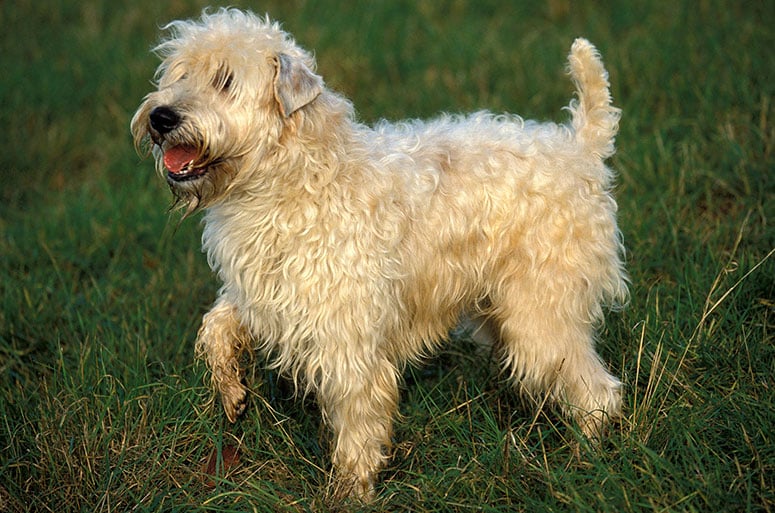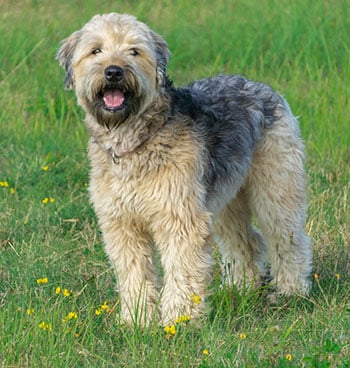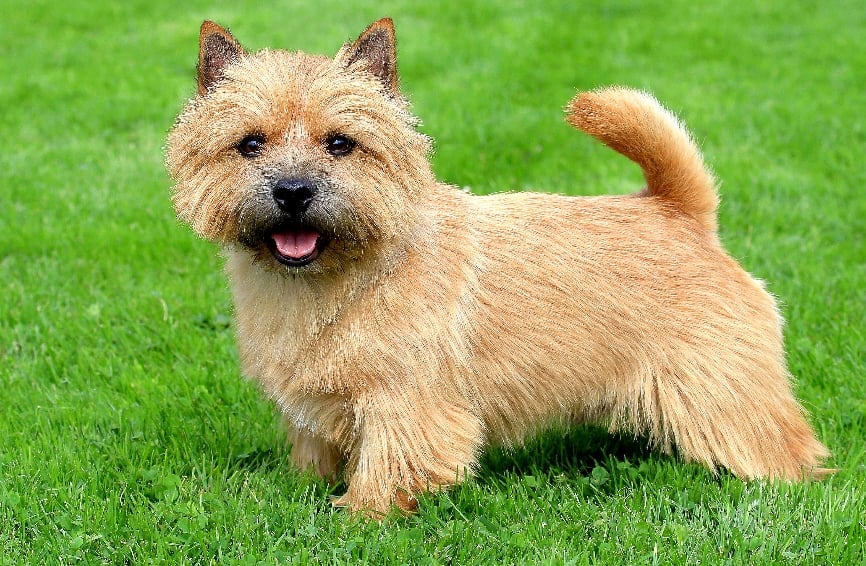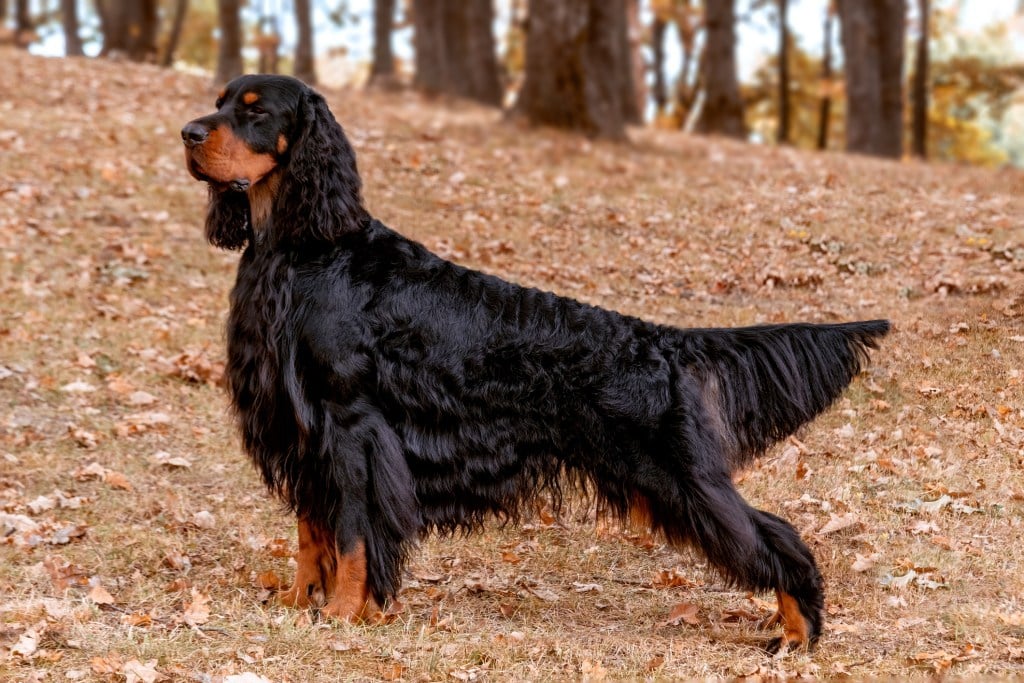Table of Contents
Introduction to Soft-Coated Wheaten Terriers
Known for their strong devotion and friendly demeanor, soft-coated wheaten terriers were once Irish farm dogs but now mostly live their lives in households as family pets. These dogs have an easygoing nature and only need a moderate amount of exercise. They are intelligent and ideal dogs for indoor living, but they are also fairly high maintenance when it comes to grooming their luscious coat.
Here’s a look at the general characteristics of soft-coated wheaten terriers and how to care for this type of dog.
Size of Soft-Coated Wheaten Terriers
Soft-coated wheaten terriers are medium-sized dogs, which makes them ideal for many households. Adult male soft-coated wheaten terriers weigh 35 to 40 pounds, while females weigh 30 to 35 pounds. Male dogs of this breed are about 18 to 19 inches tall, and females are 17 to 18 inches tall. It takes about twelve months for these dogs to reach their final, adult weight.
Here’s approximately how big you can expect your soft-coated wheaten terrier to be as he grows.
| Weight Chart | 3 months | 6 months | 9 months | 12 months |
| Male and female soft-coated wheaten terriers | 7 pounds | 15 pounds | 25 pounds | 35 pounds |
Characteristics of Soft-Coated Wheaten Terriers
Soft-coated wheaten terriers make excellent family dogs in households with children. These dogs get along with kids and other pets, and they also aren’t very wary of strangers. They can thrive in both apartments and homes with yards because they only need a few play sessions and short walks per day.
As you get to know a soft-coated wheaten terrier’s personality, here’s what you can expect based on his or her breed characteristics.
| Breed Characteristic | Level (High, Medium, Low) |
| Affectionate with People | High |
| Good with Kids | High |
| Good with Pets | High |
| Need for Exercise | Medium |
| Energy Level | Medium |
| Intelligence Level | Medium |
| Able to Be Trained | Medium |
| Amount of Barking | Medium |
| Amount of Shedding | Low |
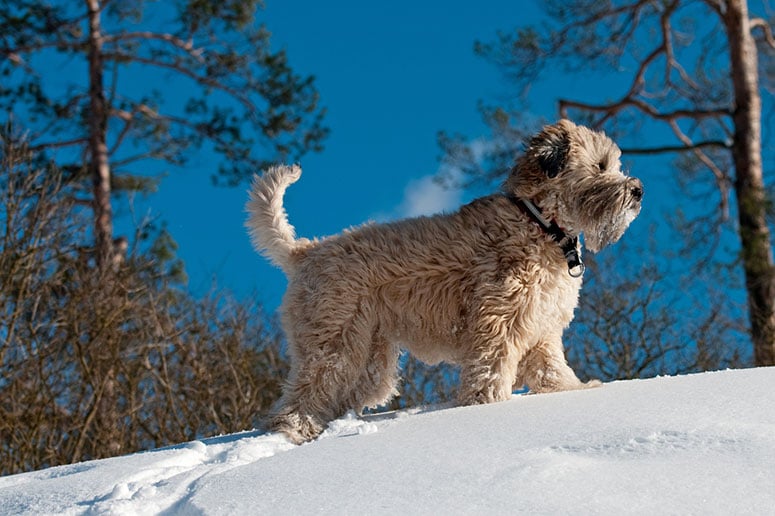
History of Soft-Coated Wheaten Terriers
The history of the soft-coated wheaten terrier can be tied to the country of Ireland, which is where the wheaten, Irish, and Kerry blue terriers originated. All of these dogs have a shared lineage and were bred to be versatile dogs for farm purposes. These dogs could do lots of different chores on the farm, including herding, guarding chicken coops, and hunting rats. But even back then, the dogs were beloved companions for people and spent time with their family members in their homes even after their farm work was done.
The Irish Kennel Club recognized the wheaten as a breed in 1937, and the first of these dogs came to the U.S. in 1946. In 1962, the Soft-Coated Wheaten Terrier Club of America formed in Brooklyn. Then in 1973, the American Kennel Club recognized this breed. Today, these dogs are among the most popular breeds in U.S. households.
Soft-Coated Wheaten Terrier Standard Information
In general, the soft-coated wheaten terrier is a hardy and balanced dog of medium size. This breed is distinguished by a soft, silky, and wavy coat of a light color. The official standard for this dog —a standard by which dogs are judged at shows and competitions— combines a demeanor that is graceful, happy, alert, and coordinated.
Here is an overview of the breed standard information for soft-coated wheaten terriers:
Head:
- Rectangular and moderately long head
- Dark reddish brown or brown eyes set wide apart
- Small to medium ears
- Skull that is flat and clean between the ears
- Strong and powerful muzzle with black and large nose
Neck, Topline, Body:
- Medium-length neck that is clean and strong
- Strong and level back
- Compact and relatively short body
- Deep chest
- Tail set on high, preferably docked
Forequarters:
- Shoulders well laid back and smooth
- Straight and well-boned forelegs
- All dewclaws removed
- Round and compact feet
Hindquarters:
- Well-bent stifles that turn neither in nor out
- Hocks well let down and parallel
- All dewclaws removed
- Black pads and dark nails
Coat:
- Abundant single coat
- Soft and silky with a gentle wave
- Not overly trimmed
Color:
- Any wheaten shade acceptable
- Puppies less than one-year-old may have darker coloring or black tipping
Gait:
- Free, lively, and graceful
- Strong drive behind
- Tails erect when moving
Caring for Soft-Coated Wheaten Terriers
Soft-coated wheaten terriers love being around humans and need a lot of attention from the people around them. If they are raised with other dogs and cats in the household, they can get along together well. These dogs make good watchdogs but poor guard dogs because of how friendly they are.
Here are some general tips for taking the best care of a soft-coated wheaten terrier:
Best Living Environments:
- Apartments
- Homes with or without a yard (fencing recommended)
- Multi-pet homes or homes with children
Types of Exercise:
- Moderate walks for about 15-minutes each
- Games of fetch
- Dog agility activities
Mental Enrichment:
- Stimulate the mind with agility training
- Socialization and play with human companions
Training Strategies:
- Basic obedience classes
- Positive reinforcement
Grooming Tips:
- Coat is easily matted and requires regular grooming.
- Brush daily, trim weekly, bathe monthly
- Brush teeth daily
- Trim nails once or twice per month
Common Health Problems of Soft-Coated Wheaten Terriers
You can expect a soft-coated wheaten terrier to live for about 12 to 14 years. This type of dog is susceptible to certain health conditions that pet parents should be aware of if considering this breed. Some of the most common health issues that arise in soft-coated wheaten terriers include the following:
- Protein-losing enteropathy and nephropathy
- Addison’s disease
- Renal dysplasia
The Soft Coated Wheaten Terrier Club of America recommends the following health tests be conducted in this breed:
- Yearly blood and urine tests, which begin at 1 year of age
- Blood chemistry panel
- Complete blood count
- Urinalysis
- Urine Protein/Creatinine Ratio or Microalbuminuria testing
- Heartworm testing
- PLN Variant Gene DNA (determines risk of developing protein-losing nephropathy)
- Fecal screening tests (identifies presence of protein-losing enteropathy or other issues)
Diet and Nutrition for Soft-Coated Wheaten Terriers
Soft-coated wheaten terriers need about 1.5 to 2.5 cups of dry dog food each day when they reach adulthood. Exact amounts will vary based on the dog’s weight and lifestyle. This amount of food should be divided into two meals for the morning and evening. Recommended brands of dog food for this breed are Science Diet, Purina, or Royal Canin.
Where to Adopt or Purchase Soft-Coated Wheaten Terriers
One resource for bringing a soft-coated wheaten terrier into your life is the national breed club, the Soft-Coated Wheaten Terrier Club of America. This organization has a website that can connect you to responsible breeders and rescue organizations. National Wheaten Rescue, Inc., Wheaten Terrier Rescue, Adopt a Pet, and Pet Finder can also help you rescue a soft-coated wheaten terrier in need of a loving home. If you prefer a purebred dog, browse the AKC Marketplace to find a list of 100 percent AKC puppies from AKC-registered litters and breeders who follow rules and regulations for responsible breeding.
Related Breeds
There are some dog breeds that are similar to the soft-coated wheaten terrier that you might be interested to learn more about if you love this type of dog. In fact, there are many different types of terrier dogs to choose from.
Here are a few examples of other terriers to look into as you are making the big decision to adopt or purchase a new dog:
- Irish terrier
- Kerry blue terrier
- Airedale terrier
- Bedlington terrier
- Cairn terrier
- Lakeland terrier
- Glen of Imaal terrier
Pet Insurance for Soft-Coated Wheaten Terriers
Regardless of a dog’s age or whether you choose to purchase or adopt, soft-coated wheaten terriers benefit from having pet insurance so that they can be cared for in the best way during all stages of growth and development. Healthy Paws offers pet health insurance for soft-coated wheaten terriers to give pet parents peace of mind that they’ll always be able to pay the bills when a new accident or injury happens.
With a top-rated Healthy Paws plan, you can also get coverage for emergency care, hereditary and genetic conditions, breed-specific conditions, and alternative care – all while seeing any licensed vet you choose. To view rates and make the best choice for your beloved canine friend, tell us a few basic details about your soft-coated wheaten terrier and request a quote on our website.
